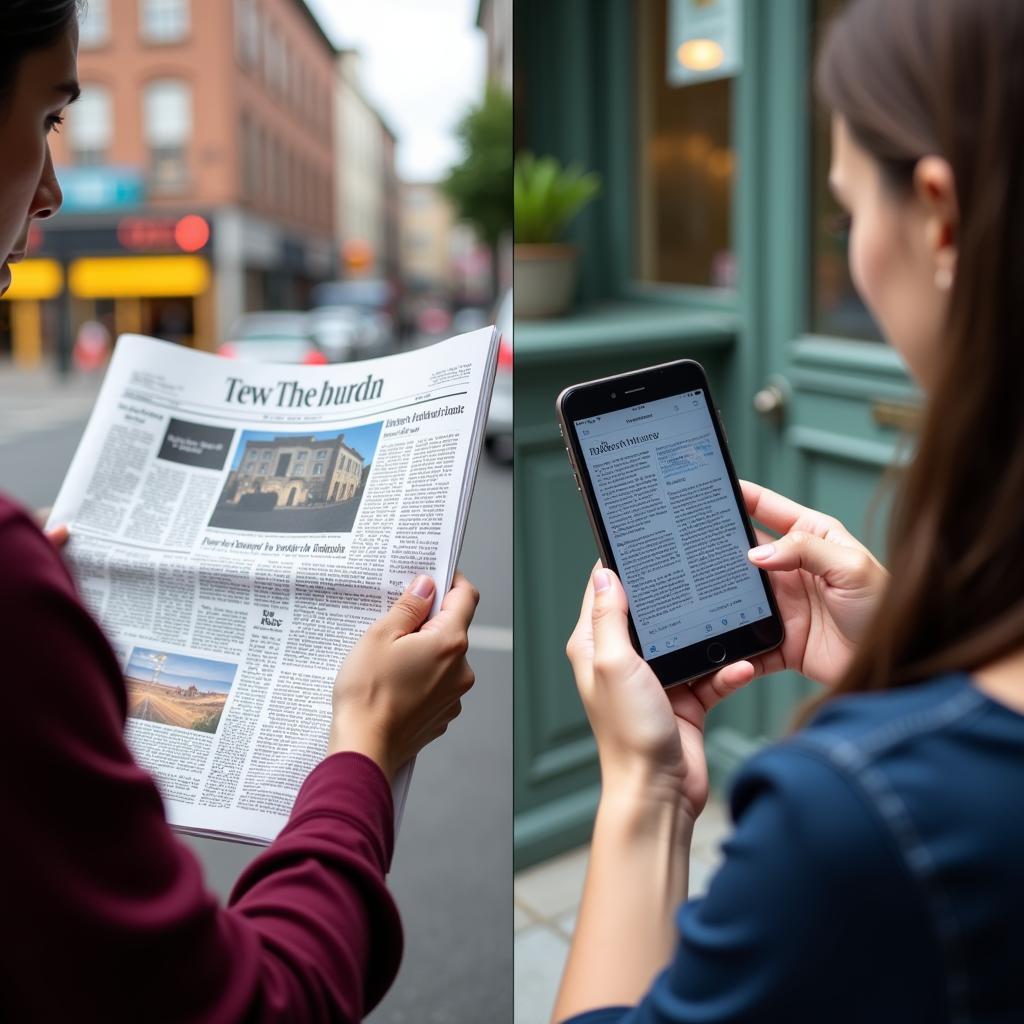Newspapers vs other media as news sources is a recurring topic in IELTS Writing Task 2, appearing approximately twice per year in recent exams. This topic reflects the ongoing debate about traditional versus modern news consumption methods, making it highly relevant for test-takers. Based on past exam analysis, here’s a commonly encountered question:
Some people think that newspapers are the best way to receive news. Others believe that they can get news better through other media. Discuss both views and give your own opinion.
Analysis of Question Requirements
- Task: Discuss both views + give opinion
- Key points to address:
- Advantages of newspapers
- Benefits of other media sources
- Personal stance with justification

Band 8 Sample Essay
Traditional media, particularly newspapers, have long been considered a reliable source of news, though many now favor alternative channels. While both formats have their merits, I believe modern media platforms offer more advantages for contemporary news consumption.
Newspapers have several distinct advantages as news sources. Firstly, they provide in-depth analysis and detailed coverage of events, allowing readers to gain comprehensive understanding of complex issues. Additionally, the editorial process in newspaper publishing ensures fact-checking and accuracy, reducing the spread of misinformation. Physical newspapers also offer a distraction-free reading experience, enabling better focus and retention of information.
However, modern media platforms present compelling benefits. Digital news sources offer immediate updates and real-time coverage, crucial in our fast-paced world. Social media and news websites provide interactive features, allowing readers to engage through comments and share perspectives globally. Furthermore, multimedia elements like videos and infographics enhance understanding of news stories, while personalization algorithms help users access relevant content efficiently.
In my opinion, while newspapers maintain their importance for detailed analysis, modern media platforms better serve contemporary news needs. The convenience, immediacy, and accessibility of digital news aligns with current lifestyle demands. Moreover, the ability to cross-reference multiple sources instantly helps readers verify information accuracy, though careful source evaluation remains essential.
Band 6.5 Sample Essay
In today’s world, people can get news from newspapers and other media sources. Both ways have good points and bad points, and I will discuss them here.
Newspapers are good for getting news because they are traditional and reliable. When people read newspapers, they can find many detailed stories about different topics. Also, newspapers have professional writers who check information before publishing. Many people, especially older ones, trust newspapers more than other sources.
Other media like internet news and TV also have advantages. These sources are faster than newspapers and can show news immediately when something happens. People can watch videos and see pictures easily. Also, young people like using phones and computers to read news because it is more convenient.
I think other media are better than newspapers for getting news today. This is because we need to know about things quickly, and waiting for tomorrow’s newspaper is too slow. Also, we can read news anywhere on our phones, which is very practical for busy people.
Scoring Analysis
Band 8 Essay Strengths:
- Sophisticated vocabulary and complex structures
- Clear organization with coherent paragraphs
- Well-developed arguments with specific examples
- Natural transition between ideas
- Balanced discussion with clear personal stance
Band 6.5 Essay Characteristics:
- Simple but clear language
- Basic paragraph organization
- Limited range of complex structures
- Some repetition in vocabulary
- Less sophisticated development of ideas
Key Vocabulary to Remember
- Editorial process (n) /ˌedɪˈtɔːriəl/ – The procedure of preparing content for publication
- Misinformation (n) /ˌmɪsɪnfəˈmeɪʃən/ – False or inaccurate information
- Real-time coverage (n) /ˈrɪəl taɪm ˈkʌvərɪdʒ/ – Immediate reporting of events
- Cross-reference (v) /krɒs ˈrefrəns/ – To compare or verify information
- Interactive features (n) /ˌɪntərˈæktɪv ˈfiːtʃəz/ – Elements allowing user engagement
- Multimedia elements (n) /ˌmʌltiˈmiːdiə ˈelɪmənts/ – Various forms of media content
- Personalization algorithms (n) /ˌpɜːsənəlaɪˈzeɪʃən ˈælɡərɪðəmz/ – Systems that customize content
For practice, try writing your own essay addressing how different generations prefer different news sources, or compare traditional and digital media’s impact on society’s news consumption habits. Share your practice essays in the comments for feedback and discussion.